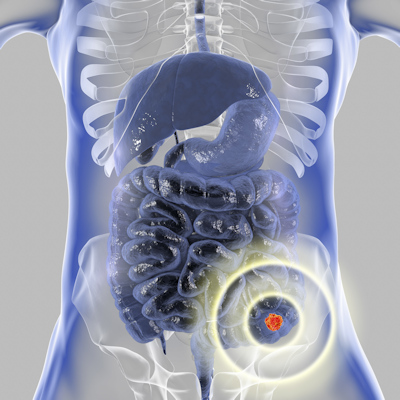June 20, 2023 -- An international clinical trial showed that selective targeted colorectal cancer therapy with the oral medication fruquintinib resulted in statistically significant improvements in both overall and progression-free survival rates. The findings, published last Thursday in the Lancet, offer hope to patients with metastatic colorectal cancer who have exhausted other treatment options.
Approximately 50% of patients with colorectal cancer develop distant metastases; the five-year overall survival rate for these patients is only 15%. Most stage IV patients have surgically unresectable disease. Currently, there is a dearth of approved effective treatments in the U.S. for metastatic colorectal patients whose cancer has progressed with standard treatments, demonstrating an unmet need for new treatment options.
Fruquintinib selectively targets and inhibits vascular endothelial growth factor receptors, which regulate the development of new blood vessels associated with tumor growth and cancer metastasis. Fruquintinib is currently approved in China under the brand name Elunate. The U.S. Food and Drug Administration (FDA) granted fruquintinib fast-track designation in June 2020; the pharmaceutical company Hutchmed, in partnership with Takeda, recently submitted a new drug application to the FDA.
The FRESCO-2 clinical trial, a global phase III multiregional study to analyze fruquintinib's efficacy, was conducted at 124 sites across 14 countries. The study recruited patients with metastatic colorectal cancer who had not responded to other treatments and who had received a median of four prior lines of therapy. The trial involved 691 patients, assigned by a 2:1 ratio to receive either fruquintinib or placebo. The fruquintinib group numbered 461, while the placebo group numbered 230.
Patients who received fruquintinib had a median survival rate of 7.4 months compared to 4.8 months for patients who received placebo plus best supportive care, and progression-free survival rates of 3.7 months versus 1.8 months. Participants who received fruquintinib had a 34% reduction in death compared to the placebo group. At six months, 24% of patients on fruquintinib were progression-free versus 1% on placebo.
The proportion of patients who were still alive at nine months was 41% in the fruquintinib group and 28% in the placebo group. The median duration of response for fruquintinib was 10.7 months. The maximum duration of response by a patient was ongoing at 16.9 months. Improvements with fruquintinib were seen regardless of treatment with prior therapies in the heavily pretreated patients who participated in the clinical trial.
Fruquintinib was well tolerated by most patients. The most frequent adverse events leading to dose reduction were hand-foot syndrome (3%) and hypertension (3.3%). Under 0.5% discontinued therapy due to treatment-related toxicity.
"Here we have a promising agent with overwhelming single agent activity," co-principal investigator and lead senior author Dr. Cathy Eng, Vanderbilt University Medical Center professor of medicine, said in a statement. "I look forward to FDA approval as well as approvals from the European Medicines Agency and the Pharmaceuticals and Medical Devices Agency in Japan, so we can offer fruquintinib to all metastatic colorectal cancer patients."
Copyright © 2023 scienceboard.net













